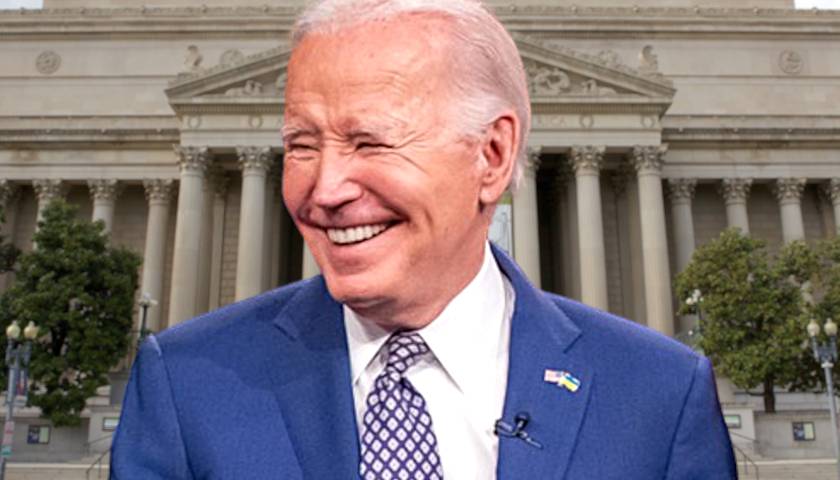Republicans did not have a great year in 2020, but 2022 could be a much better year than anyone is expecting – especially if they target these three vulnerable Senate Democrats who each won their seats with 50 percent of the vote or less.
Democrats control the Senate, but barely. The 50-50 split means Vice President Kamela Harris is needed to break ties – and that a single Democrat could stop his party’s agenda at anytime.
Working in the Democrats’ favor is their culture of putting the agenda first. While Republicans loathe to burn a seat, Democrats recognized they were sent to Washington to accomplish a mission, not build a nest and feather it. President Barack H. Obama lost the House and the Senate for the majority of his two terms, but his landmark legislations, the Dodd-Frank Wall Street Reform and Consumer Protection Act and the Patient Protection and Affordable Care Act, remain the law of the land.
If Republicans stand any chance of stopping President Joseph R.Biden Jr.‘s agenda in the Senate, they have to target and pressure vulnerable Senate Democrats, so the fear of losing their seat breaks their party allegiance.
Colorado
Colorado’s Sen. Michael F. Bennet (pictured center) seems safe from the outside looking in, but the former investment banker and senior official in the Clinton Justice Department had a tough race against a Republican newcomer retired Air Force Lt. Col. Darryl L. Glenn in 2016.
Bennet beat Glenn by 155,392 votes, but garnered barely 50 percent in an election where Libertarian Lily Tang Williams was the choice of 99,277 voters. Bennet won his first term with 48 percent of the vote in 2010.
The former banker is considered the favorite, but fact remains that not only did he not break over 50 percent in both his previous races–and then, there is his 2020 presidential campaign.
Anyone could be forgiven for not remembering Bennet’s run for the White House, which ended shortly after Feb. 11, 2021 New Hampshire Democratic primary and exposed the limits of his charisma.
The senator received 0.3 percent of the vote with 952 votes in the primary.
For context consider that Trump received 1,217 write-in votes from the same Democratic electorate.
Bennet can be beaten.
Nevada
The next vulnerable Senate Democrat is Nevada’s Sen. Catherine Marie Cortez Masto (pictured right), annointed by Senate Majority Leader Harry Reid to be his successor and who is a leading figure in the Reid political machine–a machine, which took a big hit when radical leftist Judith Whitmer became the new state party chairwoman earlier this year.
Whitmer was an active supporter of the presidential campaigns of Sen. Bernie Sanders (I.-Vt.) and was backed for the post by the local Democratic Socialists of America. It is a problem for Cortez Masto, because the senator backed Whitmer’s opponent, Tick Degerblum.
Immediately after Whitmer’s election, several party staffers resigned ahead of her taking over and the party’s executive director Alana Mounce revealed that she transferred $450,000 of the party’s $521,000 to the Democratic Senatorial Campaign Committee, which everyone believes will be targeted to support Cortez Masto.
This is not how you build party unity.
Consider, too, that despite the success of the Nevada Democratic Party in the last decade, Cortez Masto won her seat in 2016 beating Republican Rep. Joseph J. Heck with only 47 percent of the vote.
Heck was a solid doctrinaire conservative with his support for gun rights, for restoring legal protections to unborn children and for repealing Obamacare.
The Army Reserve major general did come out in support of the DREAMers, the illegal aliens Obama singled out for non-prosecution, because they came to the country as minors, but this was not what did him in.
What did him in was his decision to stand up at an Oct. 8, 2016 rally stage with 2012 Republican presidential nominee W. Mitt Romney and take back his endorsement of Trump–in response to the so-called “Access Hollywood” tape.
By all accounts, Heck and Cortez Masto neck-and-neck, but then Heck decided to dampen his turnout.
“I believe that any candidate for president should follow an ethical and moral and decent campaign as they go about the trail,” he said.
“I accept that none of us are perfect,” the congressman said. “I believe our only option is to ask Mr. Trump to step down, and to allow Republicans the opportunity to elect someone who will provide us with the strong leadership.”
Heck said it was a matter of conscience, which went over like a lead balloon with the crowd of supporters, who started booing him.
Cortez Masto beat Heck 521,994 to 495,079, a margin of 26,915 votes, which means had Heck flipped 13,458 votes, he would have won. Trump lost the Nevada to former First Lady Hillary R. Clinton, but he outpolled Heck with 512,058 votes, a margin of 16,979–meaning despite Heck’s denunciation of Trump, the New York City developer had some coattails that could have put Heck in the Senate.
Cortex Masto caught a break as Heck, egged on by Romney declared himself the opponent of his party’s nominee and she won a tight race. Going into 2022, the senator is on the wrong side of the state party, which is well aware one of her loyalists swiped $450,000 from the party till.
This Nevada Senate seat is in play.
New Hampshire
The first two examples of endangered Senate Democrats earned their designation from close races in 2016 and their recent demonstrated weakness, Bennet’s failed White House run and Cortez Masto’s loss of control of her state party.
In the case of New Hampshire’s Sen. Margaret C. “Maggie” Hassan (pictured left), she was a very close race in 2016 and unlike the first two, she has a serious challenger on the horizon Gov. Christopher T. Sununu.
Going back to 1992 with Republican Judd H. Gregg, two other New Hampshire governors have been elected to the Senate, Democrats Hassan and Sen. C. Jeanne Shaheen.
The governor is the son of former New Hampshire Gov. John H. Sununu and the brother of former senator and congressman John. E. Sununu.
In his reelection to a third term in 2020, Sununu garnered 65 percent of the vote, running at an arm’s length from Trump. When Trump campaigned in the state, the governor would welcome him at the airport, but not attend the rally – even when the rally was at the airport.
In her 2016 race, Hassan won with 48 percent of the vote against one of the truly tragic political figures in recent Senate history: Kelly A. Ayotte.
The former senator was so star-crossed that when the top Senate Republican, Majority Leader A. Mitchell “Mitch” McConnell Jr., gave Ayotte a high profile assignment to begin her comeback, it was to be the “sherpa” for Judge Brett M. Kavanaugh‘s confirmation to the Supreme Court. Tough break.
Ayotte was an unknown running third in the 2010 GOP Senate primary, when former Alaska Gov. Sarah Palin endorsed her. It was the year of the great Tea Party wave and after Palin put her in the Senate–Ayotte forgot all about her and the Tea Party.
Palin became a national figure when she ran on the GOP ticket with presidential nominee Sen. John S. McCain III (R.-Ariz.) in 2008. Interestingly, when Ayotte forsook Palin and the Tea Party, it was to become a McCain ally and mentee.
Untethered from her base, Ayotte found herself in a tough race against Hassan, the sitting governor–and yet, she only lost by 1,017 votes.
The political lore in the state is that those thousand-plus votes arrived on Election Day on the buses Democrats sent north from Massachusetts full of college students, who took advantage of the state’s same-day registration law and claimed that the Granite State was their new home.
In the 2022 election, there is still same-day registration, but a voter must provide proof that they have established a legal domicile in the state–and you can no longer use a college I.D. to register.
Facing the very popular Sununu without the buses of Bay State college students and without a star-crossed and de-based opponent such as Ayotte, puts Hassan on the ropes.
Trump redux
Yes, the 2020 election cycle did not go well for Senate Republicans, but it was not the disaster it was supposed to be either.
There were 35 Senate seats up for grabs with Republicans defending 23 and the Democrats defending 12. Even after the disaster that was Georgia for the GOP, it won 20 Senate races and lost 15.
Among these Republican wins were three senators all but written off going into Election Day, Maine’s Sen. Susan M. Collins, Iowa’s Sen. Joni K. Ernst and North Carolina’s Sen. Thomas R. “Thom” Tillis. These wins show that Repubulicans have a strategic reserve with the voters that eludes the pollsters and is immune to the Biden’s coattails.
The final factor making these five Democratic senators vulnerable is President Donald J. Trump himself.
Trump is still the biggest and only game in town. No other political figure in American politics generates the passion and attention as Trump – and if he is fully engaged in targeting these seats, they are flipping to the GOP.
– – –
Neil W. McCabe is a Washington-based national political reporter for The Tennessee Star and The Star News Network. In addition to the Star Newspaper, he has covered the White House, Capitol Hill and national politics for One America News, Breitbart, Human Events and Townhall. Before coming to Washington, he was a staff reporter for Boston’s Catholic paper, The Pilot, and the editor of two Boston-area community papers, The Somerville News and The Alewife. McCabe is a public affairs NCO in the Army Reserve and he deployed for 15 months to Iraq as a combat historian.
Photo “Senate Floor” by Eric Haynes.






